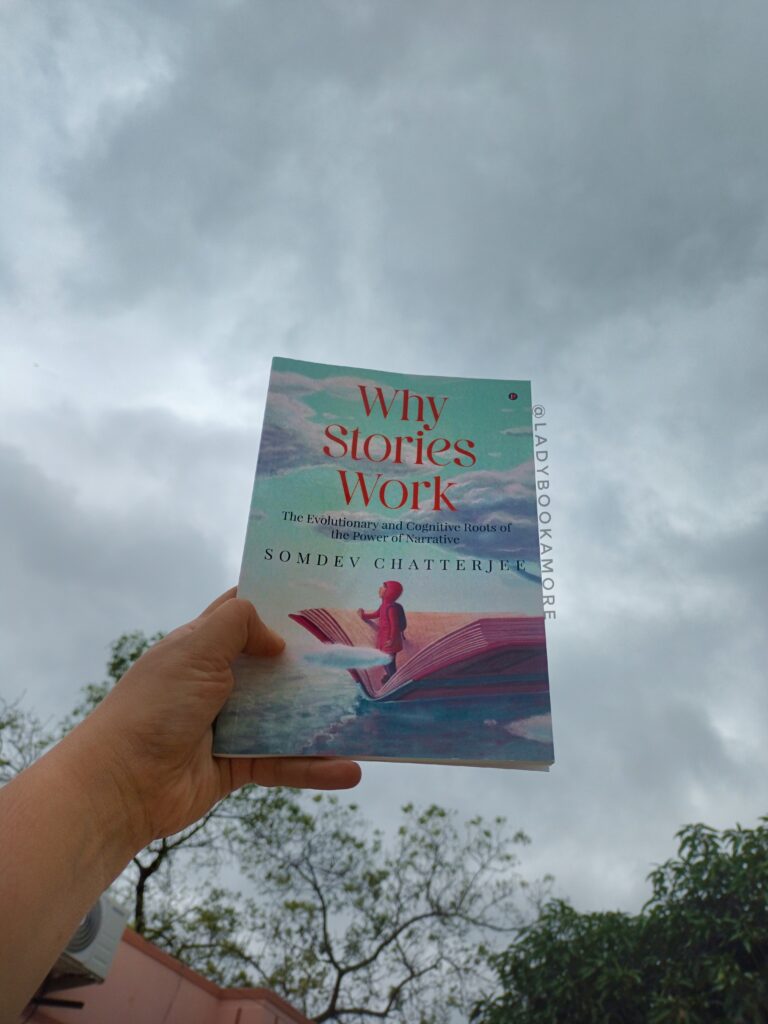
- Title: Why Stories Matter
- Author: Somdev Chatterjee
- Book Type: Discursive
- Genre: Narratology, Literary Criticism
- Edition: Paperback
- Publisher: Notion Press
- Year of Publication: 2023
- Number of Pages: 111
– Blurb of the Book –
For millions of years our ancestors survived on the marginal niches of the environment while the bigger beasts reigned on Earth. They were a bunch of weak, defenseless, and unimportant creatures serving out their time before being swept into evolution’s dustbin. Then, sometime between 200,000 and 50,000 years ago, they embarked on a journey unprecedented in the history of life on the planet – one that took them from being footnotes in the book of Life to the dominant species of the planet. What secret superpower propelled this incredible charge?
Tool use? Language? These were important, of course. But there was something else.
We learned to tell stories.
Drawing on insights from the evolutionary and social sciences, psychology, and the cognitive sciences, the author shows how the ability to tell stories has been at the foundation of our success as a species. They help us pass on crucial knowledge, imagine possible futures and co-operate flexibly in large groups. But the importance of stories in our lives goes deeper. It isn’t only that stories help us live. Recent discoveries in the cognitive sciences suggest that stories could be the most fundamental form in which we experience our lives : we live in stories every moment of our lives. That is why they have such power over us.
If you have ever been captivated by a novel, film, or television show and wondered why the storyteller is able to weave such magic (not merely how they do it); if you want to know why storytelling makes us human, and why to be human is necessarily to be a storyteller, then this book is for you.
– Lady Bookamore’s Views –

First and foremost, I sincerely thank the author for giving me an opportunity to review such an enticing text. It is always a treat to read books that talk about stories themselves. Yes, it is a story about stories, the art of storytelling, how stories have come into being and how their very nature has changed over the years.
In the 2014 Luc Besson film Lucy, Professor Samuel Norman (played by Morgan Freeman) makes a wonderful remark on the purpose of life, describing it as the process of passing down information from one generation to another. And this is where we can posit the premise of this book as well. Why Stories Work poignantly addresses a question that may have occurred to you at least once in your life – how have we come this far in the current stage of evolution? The answer is pretty simple – through stories.

Every story has a narrative, a flow of thoughts or ideas or both which inform the reader(s) about an incident, or give an instruction perhaps. Well, stories have an exhaustive range of types as well as functions, each of which contribute significantly to its dynamic nature. But, that does not mean that stories have been narrated only using language. Way before the oral traditions came into being, the image, icon, or symbol played an indispensable role in transmitting information from the source person to his/her/their intended audience. In other words, stories have always been the basis of our understanding of our world, our own past as well as of our capabilities that would help us move ahead into the future. Such is the power of Narrative.
Some of the major aspects of Why Stories Work that I admired immensely include the wonderful way in which the contents of the book have been structured. The book encompasses the evolutionary history of the factors that led to the birth of storytelling, followed by a study on how humans began engaging in mental simulations in order to come up with fictional landscapes. However, the chapter which I enjoyed reading the most is the third chapter which elaborates on the elements of a story and each of them add to its influential power not only on the reader/viewer but also on the world itself. Why Stories Work is the author’s wonderful style of writing. While he himself is an academic, the author has done a terrific job at putting forth his own ideas in the simplest ways possible.
I convey my best wishes to the author for his future endeavours.

